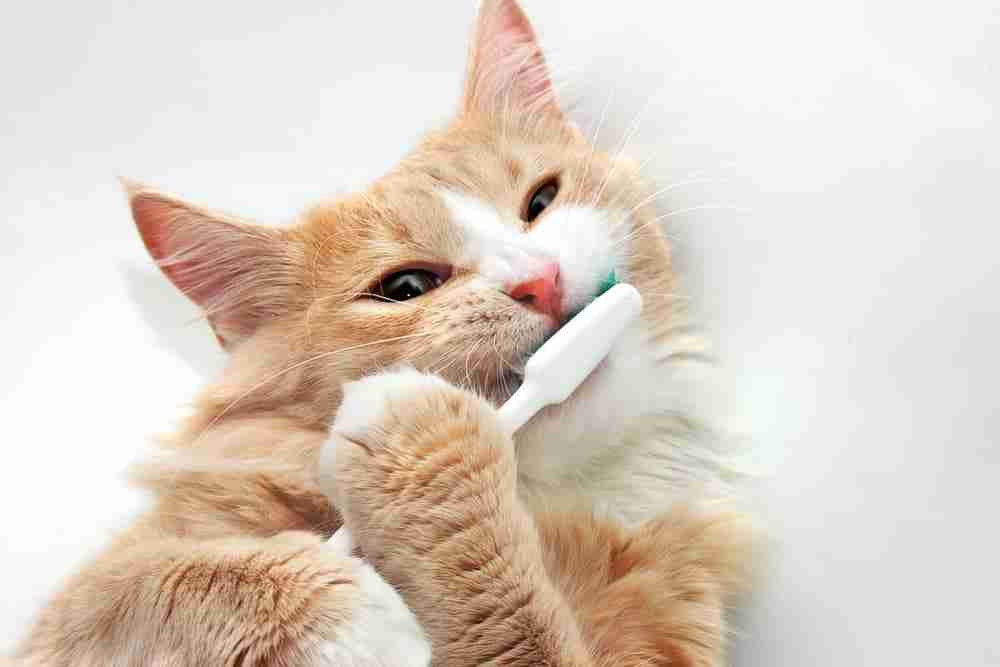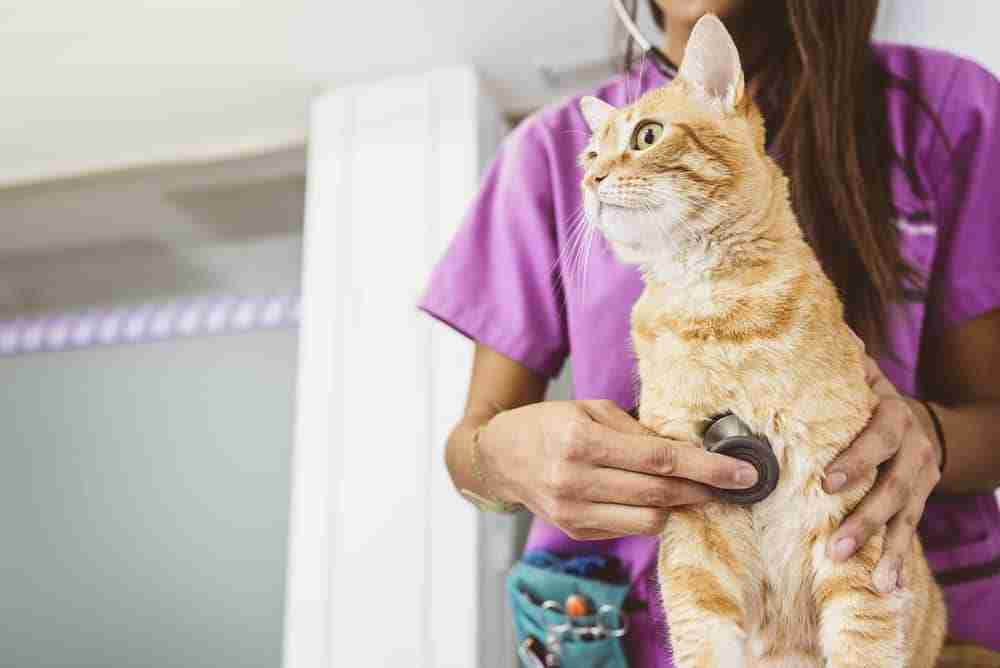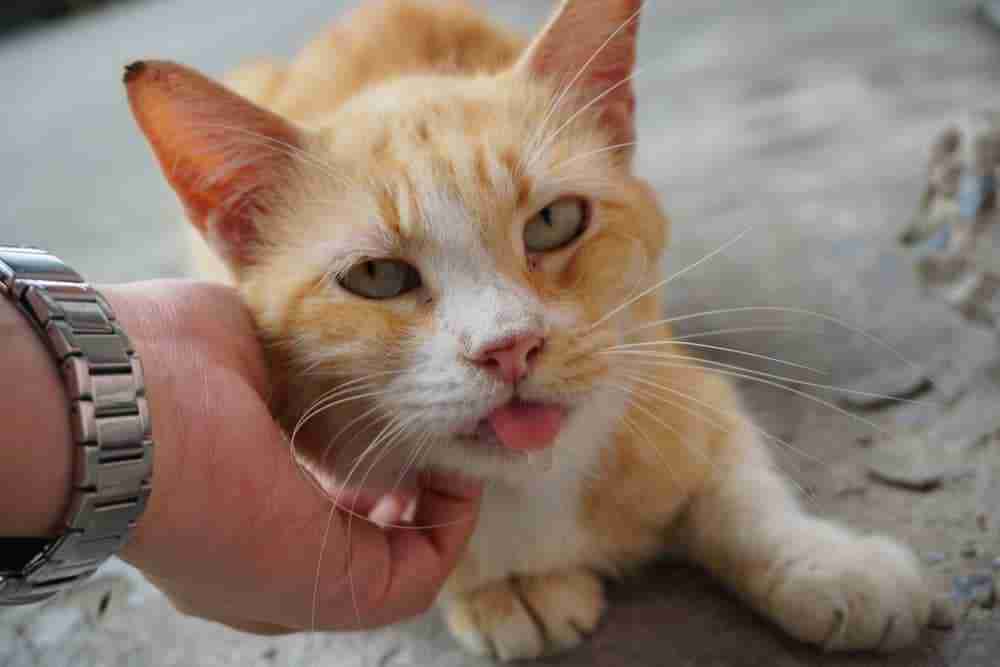Your cat comes up to greet you, rubbing her cheeks on your legs to say hello. That’s when you feel the wetness of her saliva on your leg, catching your attention. On closer inspection, it looks like your cat is drooling. Why would a cat suddenly start drooling?
Drooling? Only dogs drool, right? It’s not like your kitty should be behaving like a slobbering canine mess. The reality is cats and kittens do salivate excessively from time to time for various reasons, but it’s nothing like dogs.
This post breaks down drooling in cats and why they exhibit this behavior.
Normal Drooling in Cats
You might not realize it, but it’s reasonably common for cats to start drooling when they feel secure and relaxed. It’s behavior they adopt as kittens when they feel at ease.
If they’re lying on your lap and enjoying a scratch, they might start “needling” and purring – accompanied by a little drooling.
When kittens want to feed, they start this needling behavior on their mother’s tummy to stimulate the release of milk. The needling provides a positive feedback loop between the kitten and mother, bonding the animals.
So, when cats start needling on your lap and drooling, they’re returning to that feeling they got when nursing as a kitten; to them, it feels like pure bliss. Chances are you won’t even notice it.
Cats will also drool slightly if they’re feeling hungry, and you start preparing their dinner or offer them a treat. Cats won’t drool in the same manner as dogs at the sight of food, but a little drooling is nothing to worry about, and it’s temporary.
Stress may also cause a drooling response in your kitty. Taking a car ride to the vet or having visitors around the home might cause anxiety, triggering fooling.
Abnormal Drooling in Cats
While the above drooling scenarios are perfectly normal behavior in cats, there are times when hypersalivation could be a sign of an underlying health issue.
If your cat’s drooling occurs outside of association with food or satisfaction, it might be a cause for concern. Here are some underlying health disorders that cause abnormal drooling in cats.
Oral and Dental Disease

As apex predators, cats rely on their teeth to take down prey and to eat. If your cat has dental issues, it might cause issues with its normal saliva production and management.
Some kitties can develop severe dental problems that remain undiscovered by you or your vet until the cat starts exhibiting pain symptoms.
Dental pain can cause your cat to start salivating excessively, leading to drooling. Other oral health problems like tooth injuries, mouth ulcers, infections, gum disease, stomatitis, and resorptive lesions cause drooling behavior in cats.
If you notice abnormal excessive drooling in your feline, book an appointment with your vet for diagnosis.
Take your cat to the vet for a checkup at least once a year. During the visit, your vet examines your cat’s oral health.
Foreign Body
Some cats prefer being outdoors during the day. As a result, they wander through the neighborhood, checking things out.
Aside from their claws, cats also use their mouth when chasing prey or investigating objects. As a result, they might end up taking a bite out of something they shouldn’t.
Your cat might sustain an injury to the tissues in the tongue, gums, or the sides and roof of the mouth. If something lodges in your cat’s mouth, it might cause excessive drooling.
Never pull string or other foreign bodies from your cat’s mouth. Take your kitty to the vet immediately for professional assistance.
Tumour
Oral tumors can occur in cats leading to pain, sudden loss of appetite, and drooling.
Cats will often hide pain as a defense mechanism so look out for a loss of appetite. If your cat stops eating suddenly then check their mouth for problems including tumors.
Unfortunately, tumors in the mouth often do not have a good outcome due to the location and difficulty in removal – however, they are much rarer than other oral issues.
Toxin Exposure

As mentioned, outdoor cats experience a wider range of health problems due to their nature of running around in the local environment.
Poisoning is another issue that outdoor cats deal with on their adventures through the neighborhood. They may eat a rat that recently fed on rat poison or come across a chemical on their usual route around a neighbor’s yard. They may chew on a toxic plant such as a fern in a garden or home.
Topical toxins can also cause problems in cats, such as some tick and flea formulas. If your cat experiences poisoning, it might start excessive drooling, panting, and experience eye dilation as a response to its poisoning.
Trauma
An injury to your cat’s mouth might also be the cause of the problem. Cats might experience a branch or wire catching on their mouth when climbing.
As a result, the injury damages your cat’s mouth, causing the onset of excessive drooling. If you notice your cats drooling, do a quick inspection of their mouth to check for bleeding.
If you notice an injury, assess whether you need to take your cat to the vet for assistance.
Gastrointestinal Problems and Nausea
If your cat starts drooling excessively, it could be a sign of problems with its digestive health. Any food or digestive problem causing nausea can cause the onset of drooling behavior.
Inflammatory bowel disease, infections, or cancerous polyps might cause severe complications in your cat’s digestive system, resulting in drooling.
Along with the drooling, owners might also notice symptoms like diarrhea and weight loss. If your cat experiences a blockage in the esophagus, it makes it challenging for your cat to swallow, leading to drooling behavior.
There are several causes for nausea in cats, including kidney disease, parasites, and gastrointestinal disorders.
If your kitty appears nauseous and the behavior lasts for more than 24-hours, take them to the vet for a checkup.
If the cause of nausea and drooling isn’t apparent, the vet may run bloodwork tests on your kitty to determine the cause of the issue. The vet makes treatment recommendations based on the findings in the diagnosis.
Wrapping Up – Key Takeaways
- Drooling behavior in cats can occur for normal or abnormal reasons.
- In most cases, light drooling is nothing to worry about, and your cat doesn’t need to visit the vet.
- If your cat exhibits excessive or abnormal drooling behavior, it could be due to several issues.
- On some occasions, excessive drooling could be a sign of an underlying health issue with your cat.
- If you notice your cat drooling excessively for more than 24-hours, book an appointment with your vet.
